
The 1968 United States presidential election was the 46th quadrennial presidential election. It was held on Tuesday, November 5, 1968. The Republican nominee, former Vice President Richard Nixon, defeated the Democratic nominee, incumbent Vice President Hubert Humphrey. Analysts have argued the election of 1968 was a major realigning election as it permanently disrupted the New Deal Coalition that had dominated presidential politics for 36 years.

The 1972 United States presidential election was the 47th quadrennial presidential election. It was held on Tuesday, November 7, 1972. Incumbent Republican President Richard Nixon defeated Democratic Senator George McGovern of South Dakota.

Walter Frederick "Fritz" Mondale is an American politician, diplomat and lawyer who served as the 42nd vice president of the United States from 1977 to 1981. A United States senator from Minnesota (1964–1976), he was the Democratic Party's nominee in the United States presidential election of 1984, but lost to Ronald Reagan in an Electoral College landslide. Reagan won 49 states while Mondale carried his home state of Minnesota and District of Columbia. He became the oldest-living former U.S. vice president after the death of George H. W. Bush in 2018.
The 1968 Democratic National Convention was held August 26–29 at the International Amphitheatre in Chicago, Illinois. As President Lyndon B. Johnson had announced he would not seek reelection, the purpose of the convention was to select a new presidential nominee to run as the Democratic Party's candidate for the office. The keynote speaker was Senator Daniel Inouye (D-Hawaii). Vice President Hubert H. Humphrey and Senator Edmund S. Muskie of Maine were nominated for President and Vice President, respectively.
The 1960 Democratic National Convention was held in Los Angeles, California, on July 11–July 15, 1960. It nominated Senator John F. Kennedy of Massachusetts for President and Senator Lyndon B. Johnson of Texas for Vice President.
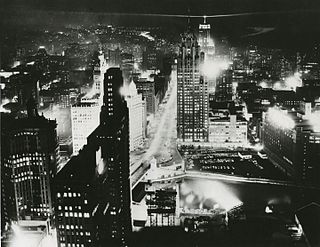
The 1956 Democratic National Convention nominated former Governor Adlai Stevenson of Illinois for President and Senator Estes Kefauver of Tennessee for Vice President. It was held in the International Amphitheatre on the South Side of Chicago, Illinois August 13–August 17, 1956. Unsuccessful candidates for the presidential nomination included Governor W. Averell Harriman of New York, Senator Lyndon B. Johnson of Texas, and Senator Stuart Symington of Missouri.
The Eugene McCarthy presidential campaign of 1968 was launched by Senator Eugene McCarthy of Minnesota in the latter part of 1967 to vie for the 1968 Democratic Party nomination for President of the United States. The focus of his campaign was his support for a swift end to the Vietnam War through a withdrawal of American forces. The campaign appealed to youths who were tired of the establishment and dissatisfied with government.

The 1960 Democratic presidential primaries were the selection process by which voters of the Democratic Party chose its nominee for President of the United States in the 1960 U.S. presidential election. Senator John F. Kennedy of Massachusetts was selected as the nominee through a series of primary elections and caucuses culminating in the 1960 Democratic National Convention held from July 11 to July 15, 1960, in Los Angeles, California.
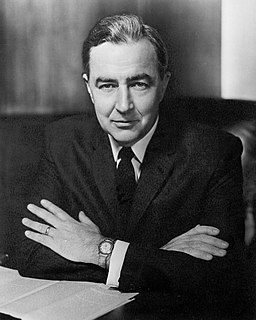
The 1968 Democratic presidential primaries were the selection process by which voters of the Democratic Party chose its nominee for President of the United States in the 1968 U.S. presidential election. Incumbent Vice President Hubert Humphrey was selected as the nominee in the 1968 Democratic National Convention held from August 26 to August 29, 1968, in Chicago, Illinois.

Hubert Horatio Humphrey, 38th Vice President of the United States (1965–1969), United States Senator from Minnesota, 35th Mayor of Minneapolis, Minnesota (1945–1948).

Electoral history of Eugene McCarthy, United States Senator (1959–1971) and Congressman (1949–1959) from Minnesota. He was a member of the Minnesota Democratic-Farmer-Labor Party.
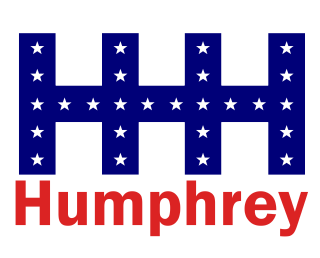
The Hubert Humphrey presidential campaign of 1968 began when Vice President of the United States Hubert Humphrey of Minnesota decided to seek the Democratic Party nomination for President of the United States following the announcement by President Lyndon B. Johnson that he would not seek the party's nomination. Johnson had been stalled by the anti-Vietnam War candidacy of Senator Eugene McCarthy of Minnesota, who along with Senator Robert F. Kennedy of New York, became the main opponents for Humphrey. The contest between the men featured a battle for control of the Democratic Party, and cast Humphrey's "old politics", against the "new politics" of McCarthy and Kennedy. The main cause of the division was the Vietnam War, which intensified during Humphrey's tenure as Vice President and grew increasingly unpopular.
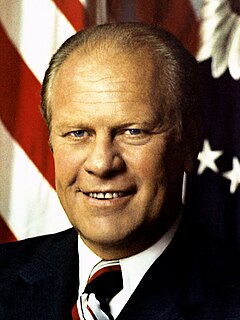
The 1976 United States presidential election in New Hampshire took place on November 2, 1976, as part of the 1976 United States presidential election, which was held throughout all 50 states and D.C. Voters chose 4 representatives, or electors to the Electoral College, who voted for president and vice president.

This article lists those who were potential candidates for the Democratic nomination for Vice President of the United States in the 1972 election. Coming into the 1972 Democratic National Convention, South Dakota Senator George McGovern had the delegate lead, but did not have the presidential nomination locked up. After winning the Democratic nomination for president on July 13, McGovern looked for a running mate. McGovern's first choice for vice president was Ted Kennedy, but Kennedy refused to join the ticket; Minnesota Senator Walter Mondale, Wisconsin Senator Gaylord Nelson, and Connecticut Senator Abraham A. Ribicoff also declined. McGovern offered the position to Missouri Senator Thomas Eagleton, who appealed to labor groups and Catholics, two groups that McGovern had alienated during the primary campaign. The ticket of McGovern and Eagleton was nominated by the 1972 Democratic National Convention. Following the convention, it was revealed that Eagleton had received treatment for depression. Though McGovern considered keeping Eagleton on the ticket, he ultimately chose to replace Eagleton with former Ambassador Sargent Shriver. The McGovern-Shriver ticket lost the presidential election to the Nixon-Agnew ticket. After the controversy surrounding Eagleton, future campaigns spent much more time vetting vice presidential candidates.
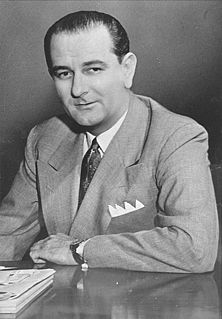
This article lists those who were potential candidates for the Democratic nomination for Vice President of the United States in the 1960 election. After winning the presidential nomination on the first ballot of the 1960 Democratic National Convention, Massachusetts Senator John F. Kennedy turned his attention to picking a running mate. Kennedy chose Senate Majority Leader Lyndon B. Johnson, who had finished second on the presidential ballot, as his running mate. Johnson, a Protestant Texan, provided geographical and religious balance to a ticket led by a Catholic Northeasterner, but many liberals did not like the pick. Many were surprised both that Kennedy made the offer and that Johnson accepted the offer, as the two had been rivals for the 1960 presidential nomination. According to some accounts, Kennedy had offered the position to Johnson as a courtesy and expected Johnson to decline the offer; when Johnson accepted, Kennedy sent his brother, Robert F. Kennedy, to talk Johnson out of accepting the offer. However, Kennedy may have made the offer in earnest due to Johnson's appeal in the south, Johnson's friendly relationship with Speaker of the House Sam Rayburn, and Kennedy's desire to remove Johnson as Senate Majority Leader in favor of the more liberal Mike Mansfield. Regardless, Johnson decided that accepting the offer would be better for his political career and better position himself to become president, and so he chose to become Kennedy's running mate. The Democratic convention confirmed Johnson as the vice presidential nominee, although the delegation from Washington, D.C. attempted to select Minnesota Governor Orville Freeman instead.

The 1964 United States presidential election in Minnesota took place on November 3, 1964, in Minnesota as part of the 1964 United States presidential election.

The 1964 United States presidential election in Connecticut took place on November 3, 1964, as part of the 1964 United States presidential election, which was held throughout all fifty states and D.C. Voters chose eight representatives, or electors to the Electoral College, who voted for president and vice president.


















